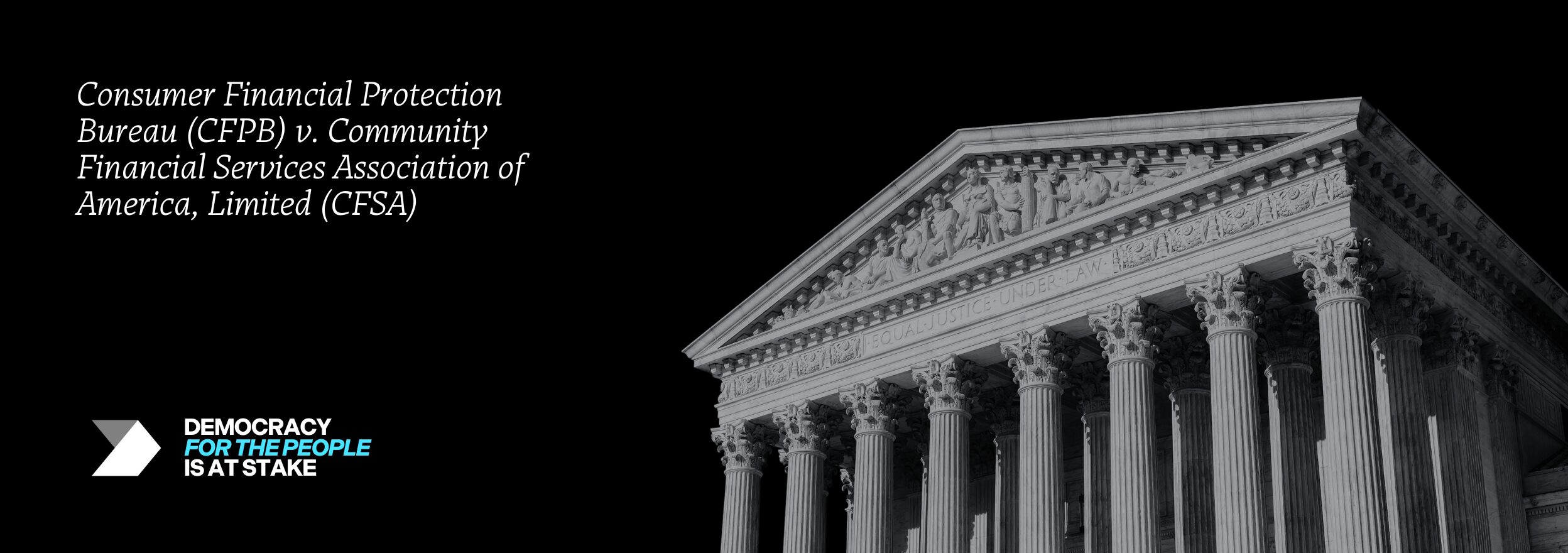
What started as an attack on critical consumer protections against payday lending became a case challenging the constitutionality of how the CFPB is funded. The radical argument plaintiffs made was that because Congress chose to fund the CFPB outside of the annual appropriations process, its statutory funding mechanism violates the Appropriations Clause of the Constitution, making the agency unconstitutional.
SCOTUS RULING
On Thursday, May 16, 2024 the U.S. Supreme Court ruled in a historic victory that the funding structure of the Consumer Financial Protection Bureau (CFPB) is constitutional, rejecting the arguments made by predatory payday lenders. The Court rejected a fringe and baseless legal theory endorsed by the Fifth Circuit that put the economic well-being of the American people in jeopardy. The Court affirmed Congress’ power to structure the CFPB to function in times of national crisis and gridlock. Read Democracy Forward’s press release reacting to the decision here.
WHAT’S AT STAKE
First, this case threatened a critical agency that Congress, representing the will of the people, created to protect consumers in response to a massive economic crisis. If the Court accepted this radical argument, which had been consistently rejected by federal courts until a single recent Fifth Circuit decision, the decision could have upended the CFPB and its ability to protect consumers and hold the financial industry accountable.
Beyond that, a decision in this case could have upended our entire economy, undermined any program in the federal government funded outside of annual appropriations (almost two-thirds of federal spending) and have been a loaded weapon for an anti-democratic administration to place critical government programs under their thumb. What does that look like? Because the following agencies and programs receive funding outside of the appropriations process just like the CFPB, they could have been under threat next:
- The work of the Federal Reserve and the U.S. Mint, in addition to the CFPB, to ensure economic stability
- Medicare, Medicaid, and Social Security—all critical benefits that millions rely on
- The U.S. Postal Service
- The agency that supplies much-needed loans to our nation’s farmers
WHO IS INVOLVED
People Defending Progress:
A broad coalition of communities spoke out to defend the CFPB and raise the alarm about how upholding the Fifth Circuit’s radical decision could upend the economy and cause real harm in people’s lives.
That coalition includes the rural and agricultural organizations that Democracy Forward represented, consumer advocacy organizations, civil rights organizations, AARP, small financial and lending institutions, housing and real estate industry associations, 144 current and former Members of Congress, 23 states and the District of Columbia, and more.
Extremists Attacking Democracy:
A cast of former Trump administration officials weighed in on this case. Noel Franscisco, Trump’s Solicitor General, was representing the plaintiff CFSA in the case. Mick Mulvaney, who was both Trump’s former chief of staff and Acting CFPB Director, submitted a friend of the court brief supporting CFSA, and he was represented on that brief by Eric Blankenstein, a senior Trump official who had to resign from the CFPB because of his past racist posts.
This case reaching the Supreme Court is the culmination of far-right actors pushing a rejected, radical legal theory for more than a decade, until they found a federal appeals court willing to validate it.
Despite courts across the country summarily dismissing these legal claims, the far right has continued to advance it, both through the legal system and in the public sphere. Those attacks began as early as 2012, when far-right actors began pushing the theory that the CFPB’s funding structure was unconstitutional in court, with little regard to the overwhelming consequences. Since then, a range of far-right extremists have repeated the theory before Congress, in journals, in seminars and roundtables, and in the media—all to try and and win through the force of repetition.
As many as ten organizations connected to Leonard Leo appeared in this case. These included: America’s Future, U.S. Constitutional Rights Legal Defense Fund, the Foundation for Government Accountability, the U.S. Chamber of Commerce, the New Civil Liberties Alliance, the Buckeye Institute, the Manhattan Institute for Policy Research, Americans for Prosperity Foundation, Atlantic Legal Foundation, and Center for Constitutional Jurisprudence.